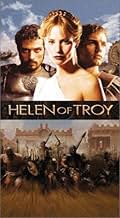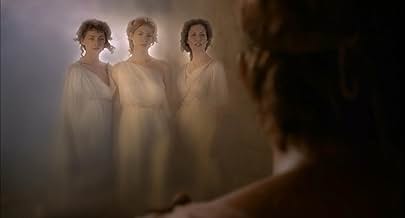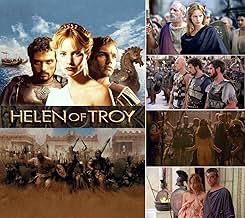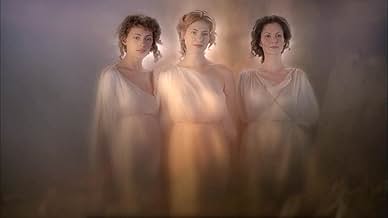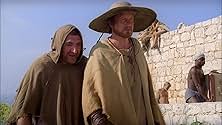CALIFICACIÓN DE IMDb
6.2/10
6.9 k
TU CALIFICACIÓN
El rapto de la bella Helena, esposa del rey espartano Menelao, por Paris de Troya desencadena una larga guerra.El rapto de la bella Helena, esposa del rey espartano Menelao, por Paris de Troya desencadena una larga guerra.El rapto de la bella Helena, esposa del rey espartano Menelao, por Paris de Troya desencadena una larga guerra.
- Nominado a 1 premio Primetime Emmy
- 1 premio ganado y 7 nominaciones en total
Explorar episodios
Opiniones destacadas
As a big fan of mythology and the Iliad, I'm pretty surprised by how nitpicky people are being on the details. Having taken a "Mythology in Film" course, I can safely state the following:
1) It's not supposed to be "The Iliad," it's "Helen of Troy." 2) It's a film. Made 3,000 years later. Targeted at an entirely different audience. 3) Greek mythology tends to be greatly inconsistent anyway, depending on your source. 4) Patroklus is never mentioned to justify Achilles's rage against Hector. So what? If Achilles hadn't withdrawn from war, he would've killed Hector anyways. And having him withdrawing and re-entering into the war would only have distracted from the main story (Helen) without really adding anything.
There's a difference between myths and literature. One can stray from the literature of a story while staying true to the mythology of it. The Iliad itself was constantly being reinvented by generations of oral poets who changed the story every time they performed it. Back in ancient times, a person who merely recited the story verbatim would be considered an inferior, because he'd merely be a copycat rather than a storyteller.
When it comes to the spirit and tradition, "Helen" shines. For instance, in the Iliad, Achilles compares Agamemnon taking Brisius to Paris taking Helen. In the film, the comparison is made literal. Brilliant. Then you have themes and scenes taken from the Orestia. Three or four different ideas are brought together in the span of one.
"Helen" may be a bit loose with the details, but it shows a good understanding why those details took place, and stays true to capturing their motivations. Just because they don't follow the material exactly doesn't mean they don't know it really, really well. The same is true for a lot of other film productions, from "Desire Under the Elms" to "O Brother Where Art Thou" to "Medea" and even "Clash of the Titans."
All and all, a good flick, I was pleasantly surprised. My only real complaints was the casting of Achilles (I assume they were combining his character with Ajax/Diomedes) and the fact that Hector never gets to actually beat anyone in combat (That was disappointing, to say the least).
1) It's not supposed to be "The Iliad," it's "Helen of Troy." 2) It's a film. Made 3,000 years later. Targeted at an entirely different audience. 3) Greek mythology tends to be greatly inconsistent anyway, depending on your source. 4) Patroklus is never mentioned to justify Achilles's rage against Hector. So what? If Achilles hadn't withdrawn from war, he would've killed Hector anyways. And having him withdrawing and re-entering into the war would only have distracted from the main story (Helen) without really adding anything.
There's a difference between myths and literature. One can stray from the literature of a story while staying true to the mythology of it. The Iliad itself was constantly being reinvented by generations of oral poets who changed the story every time they performed it. Back in ancient times, a person who merely recited the story verbatim would be considered an inferior, because he'd merely be a copycat rather than a storyteller.
When it comes to the spirit and tradition, "Helen" shines. For instance, in the Iliad, Achilles compares Agamemnon taking Brisius to Paris taking Helen. In the film, the comparison is made literal. Brilliant. Then you have themes and scenes taken from the Orestia. Three or four different ideas are brought together in the span of one.
"Helen" may be a bit loose with the details, but it shows a good understanding why those details took place, and stays true to capturing their motivations. Just because they don't follow the material exactly doesn't mean they don't know it really, really well. The same is true for a lot of other film productions, from "Desire Under the Elms" to "O Brother Where Art Thou" to "Medea" and even "Clash of the Titans."
All and all, a good flick, I was pleasantly surprised. My only real complaints was the casting of Achilles (I assume they were combining his character with Ajax/Diomedes) and the fact that Hector never gets to actually beat anyone in combat (That was disappointing, to say the least).
In connection with mythology, our class was given the opportunity to view the film, Helen of Troy, last July 26 to August 2, 2005. Helen of Troy, released during the year 2003, is a movie produced by Ted Kurdyla and directed by John Kent Harrison. It was based on Homer's "Iliad" and its primary focus is "The Trojan War", which is one of the greatest stories in Ancient Literature. The film involves the story of Helen, the most beautiful woman in the world, being married to Menelaus in a land called Sparta. When Prince Paris comes to seek peace with Sparta, Helen falls madly in love with him and follows him to Troy. Enraged, Menelaus calls upon the Greek army to fulfill the oath they once swore: to defy anyone who stole Helen. From thus, the battle for Helen's love was started, putting the lives of many great warriors at stake. Although, the story presented a different plot from the text, people who haven't read it would be able to grasp the main idea from the movie. I was disappointed by the way the writers portrayed the character of Achilles, especially his line: "I stand before High King Agamemnon". Achilles was not under anyone, not even the highest of Kings; he cared for his own skin and fought for his own glory. Making him faithful to Agamemnon and responsible for no one else was a mistake because it means to show there were no other people involved who concerned Achilles. I also did not like the reason the writers made for Achilles killing Hector. According to the text, Achilles kills Hector to avenge his best friend's death not to save Agamemnon. Another significant difference was Helen begging for the body of Hector from Agamemnon, which was wrong; I believe it's important that Priam, Hector's father, was the one who asked for his son's body from Achilles because it shows that despite all the people Achilles has killed, there was still compassion left in the heart of even the most ruthless warrior. What worked particularly well for the film was the focus on Helen's royal family; it explained a lot about Helen's background, thus giving the audience more information than in the text.
I give this movie, a final rating of 4. The setting, effects and the cinematography was great. It made me feel as if it's the exact place where the battle happened. Helen of Troy is a movie that immediately captures its audience, engraving into their hearts the message it wishes to impart, which is: there will always be people who are ready to fight, whether it be for love of country, love of glory, or simply loving someone.
I give this movie, a final rating of 4. The setting, effects and the cinematography was great. It made me feel as if it's the exact place where the battle happened. Helen of Troy is a movie that immediately captures its audience, engraving into their hearts the message it wishes to impart, which is: there will always be people who are ready to fight, whether it be for love of country, love of glory, or simply loving someone.
Greek warriors attack and besiege Troy when Paris takes Helen and both of them escape. This mythological fantasy finds Helen , the beautiful wife falling in love with prince Paris , an event that leads to the siege of Troy .Director John kent Harrison picked two bright young stars Matthew Mardsen and Sienna Guilery to play the lovers in this breathtaking Tv story in 2 episodes of the Trjan War and the motives led up to it. As Greek warriors under command of Agamenon, Ulysses , Achilles and Menelao get to hide out in the Trojan Horse with fellow fighters and then get those Trojanswhen they take the wooden beast into the city and they are successful.
After a hardworking shooting and budget enough the results were only fair and passable.the picture ignores script for lavish effects , most of them made by means of computer generator.In the picture appears several historical and mythological characters played by notorious actors as Priamo:john Rhy Davies ,Agammenon : Rufus Sewell, Achilles: Joe Montana,Hector:Daniel Lapine,Theseus: Stellan Skarsgard, Clymnestra: Katie Blake , Menelao : James Callis Hecuba: Marian Dabo, and the Medium Cassandra performed by Emily Fox.
These events about Troy war has been adapted several times such as :Italian version titled Trojan Horse 1962 by Giorgio Ferroni with Steve Reeves Juliette Mayniel Lidia Alfonsi Mimmo Palmara. Rendition by Robert Wise with Rossana Podesta Jacques Sernas Brigitte Bardor Stanley Baker Cedric Hardwicke . TROY by wolfgang Petersen with Brad Pitt Diane Kruger Rose Byrne Orlando Bloom
After a hardworking shooting and budget enough the results were only fair and passable.the picture ignores script for lavish effects , most of them made by means of computer generator.In the picture appears several historical and mythological characters played by notorious actors as Priamo:john Rhy Davies ,Agammenon : Rufus Sewell, Achilles: Joe Montana,Hector:Daniel Lapine,Theseus: Stellan Skarsgard, Clymnestra: Katie Blake , Menelao : James Callis Hecuba: Marian Dabo, and the Medium Cassandra performed by Emily Fox.
These events about Troy war has been adapted several times such as :Italian version titled Trojan Horse 1962 by Giorgio Ferroni with Steve Reeves Juliette Mayniel Lidia Alfonsi Mimmo Palmara. Rendition by Robert Wise with Rossana Podesta Jacques Sernas Brigitte Bardor Stanley Baker Cedric Hardwicke . TROY by wolfgang Petersen with Brad Pitt Diane Kruger Rose Byrne Orlando Bloom
There are many different stories and interpretations of Homer's Iliad, or better known as the 'Trojan War.' 'Helen of Troy' is one movie that showed a different perspective of the events in the leading lady's point of view.
The Iliad written by Homer, from which this film was based on, talks about the 'greatest war story ever told': the infamous 'Trojan War.' This legendary epic began with the elopement of Helen, the fairest woman in the land, and Troy's cursed Prince Paris. Menelaus, her husband, mad with jealousy and broken pride, allied with his brother, Agamemnon, to wage a war against Troy. They put together a great army consisting of the greatest and bravest warriors of their land, Greece. When they arrived at Troy, a dispute rose between Agamemnon and Achilles because of their women prizes, Chryseis and Briseis. This resulted to Achilles' refusal to participate in the war for nine years. During that time, victory for each country wavered as the gods and goddesses in Olympus helped their favorite side. When Achilles decides to fight at last, it is in revenge for his best companion, Patroclus who was killed by Hector. He slew Hector and dragged his body to his camp. Despite Zeus' disagreement, Hector died because he was fated to do so. Odysseus came up with the idea of the Wooden Horse. He planned to get inside the gates of Troy so they could finally attack. The Trojans brought in the horse and when night fell, the Greeks attacked the Trojans, burnt their houses, killed their children and took their women as prizes.
The characters portrayed in the movie were fashioned in such a way that they appeared to be real and complex human beings. They gave in to their desires and to their human weaknesses such as pride, jealousy and anger but they also fought for justice, honor and love. Therefore you can easily sympathize and understand their actions and decisions since we all have the same human flaws and experiences. Most of the characters in 'Helen of Troy' were very much true to the original text in the Iliad. However, some key roles were fabricated to make the audience sympathize and admire characters like Paris, Helen and Menelaus as opposed to their selfish and arrogant personalities in the Iliad. They acted very well and very convincing such that they become distinct from the other characters in the story. Each person was unique to the other.
The script of the movie was true to the text to some extent. The beginning of 'Helen of Troy' started with the judgment of Paris in Mount Ida, which first introduced the prince to Helen. He was banished from Troy to the mountain as an infant because of Cassandra's prophecy that he will cause the end of their country. He finds out that he is a prince of Troy when he defeats Hector in a game and is finally accepted into the family despite his sister's constant protests. During her sister's wedding, Helen was abducted by Theseus and was brought to his country. They stayed together for a few years and Helen started falling in love with him until Pollux came to save her and was killed in the process. Theseus also died and Helen was brought back to Sparta where her father, Tyndareus, gave her away to the soldiers. The soldiers couldn't deny her beauty but decided to choose the husband by tossing rings. The one closest to the jar was Menelaus' and therefore, they married. Once, Paris went to Sparta to make peace with the city but when he sees Helen, they fall in love. They elope and when Menelaus found out about this, he associated with his brother, Agamemnon. Upon Reaching Troy, Menelaus first decides to talk to Priam, the country's king. Priam refuses to give Helen back and that's where the war began.
Overall, the movie, 'Helen of Troy', has been loyal to the original text in the Iliad except in some aspects. They both portray roughly the same roles and personalities of the characters. Although love was not a plausible theme in Homer's text as shown in the movie and the gods' influencing the waves of war weren't concretely depicted in the film, other themes like pride and honor coincided in both. The changes in the script didn't ruin the outcome of the movie. They just served as a form of exaggeration to further establish the uniqueness of the characters. The Iliad is classic, and it should be remembered this way.
The Iliad written by Homer, from which this film was based on, talks about the 'greatest war story ever told': the infamous 'Trojan War.' This legendary epic began with the elopement of Helen, the fairest woman in the land, and Troy's cursed Prince Paris. Menelaus, her husband, mad with jealousy and broken pride, allied with his brother, Agamemnon, to wage a war against Troy. They put together a great army consisting of the greatest and bravest warriors of their land, Greece. When they arrived at Troy, a dispute rose between Agamemnon and Achilles because of their women prizes, Chryseis and Briseis. This resulted to Achilles' refusal to participate in the war for nine years. During that time, victory for each country wavered as the gods and goddesses in Olympus helped their favorite side. When Achilles decides to fight at last, it is in revenge for his best companion, Patroclus who was killed by Hector. He slew Hector and dragged his body to his camp. Despite Zeus' disagreement, Hector died because he was fated to do so. Odysseus came up with the idea of the Wooden Horse. He planned to get inside the gates of Troy so they could finally attack. The Trojans brought in the horse and when night fell, the Greeks attacked the Trojans, burnt their houses, killed their children and took their women as prizes.
The characters portrayed in the movie were fashioned in such a way that they appeared to be real and complex human beings. They gave in to their desires and to their human weaknesses such as pride, jealousy and anger but they also fought for justice, honor and love. Therefore you can easily sympathize and understand their actions and decisions since we all have the same human flaws and experiences. Most of the characters in 'Helen of Troy' were very much true to the original text in the Iliad. However, some key roles were fabricated to make the audience sympathize and admire characters like Paris, Helen and Menelaus as opposed to their selfish and arrogant personalities in the Iliad. They acted very well and very convincing such that they become distinct from the other characters in the story. Each person was unique to the other.
The script of the movie was true to the text to some extent. The beginning of 'Helen of Troy' started with the judgment of Paris in Mount Ida, which first introduced the prince to Helen. He was banished from Troy to the mountain as an infant because of Cassandra's prophecy that he will cause the end of their country. He finds out that he is a prince of Troy when he defeats Hector in a game and is finally accepted into the family despite his sister's constant protests. During her sister's wedding, Helen was abducted by Theseus and was brought to his country. They stayed together for a few years and Helen started falling in love with him until Pollux came to save her and was killed in the process. Theseus also died and Helen was brought back to Sparta where her father, Tyndareus, gave her away to the soldiers. The soldiers couldn't deny her beauty but decided to choose the husband by tossing rings. The one closest to the jar was Menelaus' and therefore, they married. Once, Paris went to Sparta to make peace with the city but when he sees Helen, they fall in love. They elope and when Menelaus found out about this, he associated with his brother, Agamemnon. Upon Reaching Troy, Menelaus first decides to talk to Priam, the country's king. Priam refuses to give Helen back and that's where the war began.
Overall, the movie, 'Helen of Troy', has been loyal to the original text in the Iliad except in some aspects. They both portray roughly the same roles and personalities of the characters. Although love was not a plausible theme in Homer's text as shown in the movie and the gods' influencing the waves of war weren't concretely depicted in the film, other themes like pride and honor coincided in both. The changes in the script didn't ruin the outcome of the movie. They just served as a form of exaggeration to further establish the uniqueness of the characters. The Iliad is classic, and it should be remembered this way.
I can't believe that the writers of this miniseries read any of the myths or the Iliad itself. The inconsistencies were truly amazing. But I guess it didn't matter, as the plot seemed to revolve around fighting and nudity. First of all Cassandra could not have told her father to kill the infant Paris; she did not receive her powers until she was a young woman. Apollo wanted her; she said yes and received the gift of prophecy; then, when she refused him, he could not take it back but cursed her that no one would believe her. Helen was not kidnapped by Theseus! Clytemnestra had three children, and Orestes and Elektra helped her wreak her vengeance for the death of Iphigenia. The gods & goddesses took a much more active part in the war, with Aphrodite telling Paris where to shoot Achilles and Athena guiding Odysseus, her favorite. The arrow in the heel meant nothing without the explanation. Agamemnon took Cassandra as part of his spoils. Hector had a wife, Andromache, whom he adored. Where was she? Where was Ajax?This was just too far from canon. One thing I did like was the loving relationship between Clytemnestra and her daughter Iphigenia; it was very understandable why she would kill Agamemnon.
As for the actors, Helen was not that beautiful. It was good to see John Rhys-Davies, but he was too thin and did not look well. Maryam D'Abo was made to look too old--an older actress should have been cast. She's still a Bond girl to me! Achilles was overplayed, and there was no reason for him to be bald. I did like Odysseus, however.
I'm not really sorry I watched it, just a little ashamed of myself for sticking out the whole four hours.
As for the actors, Helen was not that beautiful. It was good to see John Rhys-Davies, but he was too thin and did not look well. Maryam D'Abo was made to look too old--an older actress should have been cast. She's still a Bond girl to me! Achilles was overplayed, and there was no reason for him to be bald. I did like Odysseus, however.
I'm not really sorry I watched it, just a little ashamed of myself for sticking out the whole four hours.
¿Sabías que…?
- TriviaThis adaptation changes several aspects of the original legend of Helen. The gods play almost no role in the characters' lives, Helen is not shown to have any children and it's not explained how Cassandra supposedly got her powers. Instead, the series plays the story like a brutal historical event with little supernatural elements.
- ErroresIt is mentioned three times that Troy is the gateway to the riches of Byzantium. The city of Byzantium was founded in 667BC five centuries after the Trojan War.
- ConexionesReferenced in In Praise of Action (2018)
Selecciones populares
Inicia sesión para calificar y agrega a la lista de videos para obtener recomendaciones personalizadas
- How many seasons does Helen of Troy have?Con tecnología de Alexa
Detalles
- Tiempo de ejecución1 hora 28 minutos
- Color
- Mezcla de sonido
- Relación de aspecto
- 1.78 : 1
Contribuir a esta página
Sugiere una edición o agrega el contenido que falta

Principales brechas de datos
What is the Spanish language plot outline for Helena de Troya (2003)?
Responda

